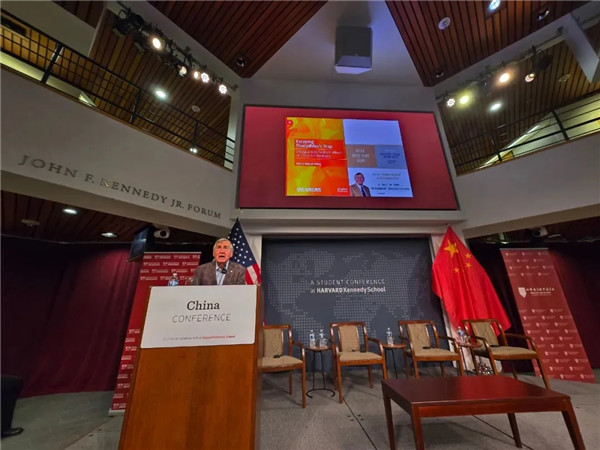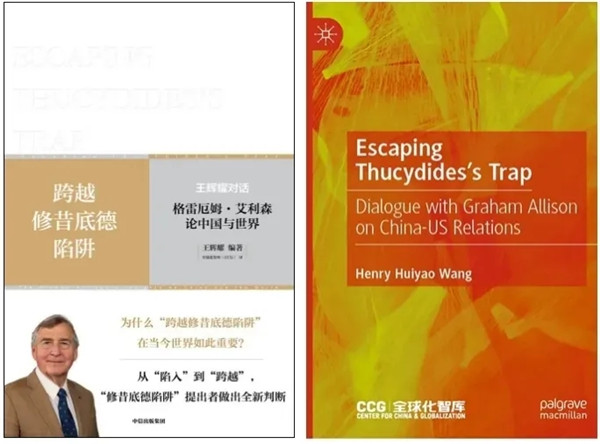Wang Huiyao speaks at Harvard Kennedy School’s China Conference
April 26 , 2025CCG President emphasised the need to move beyond trade protectionism, promote mutual understanding through people-to-people exchanges, and uncover new potential for cooperation.
On April 26, Wang Huiyao, Founder & President of the Center for China & Globalization (CCG) delivered a speech and engaged in a panel discussion at China Conference, a student-run conference at Harvard Kennedy School.


Graham Allison, Douglas Dillon Professor of Government and the “Founding Dean” of the John F. Kennedy School of Government at Harvard University, was also among the panelists.

During the conference, he also showed Wang Huiyao ’s book, Escaping Thucydides’ Trap: Dialogue with Graham Allison on China-US Relations, which was published by Palgrave Macmillan in English and by CITIC Press Group with the facilitation of CCG in Chinese.

Available below is a transcript of Wang’s speech. Slight changes have been made.
Speech at Harvard Kennedy School: From Academic Insights to Global Governance – On the Path to Breaking Through Sino-US Relations
Dear professors, students, and dear friends,
Returning to Harvard Kennedy School, walking among the familiar red-brick buildings, the shimmering waters of the Charles River and Harvard Square lights seem to weave a tunnel through time. Almost Forty years ago, I first arrived here, launching my in-depth exploration of Sino-US relations and Globalization studies in this beautiful campus that has witnessed countless intellectual debates and exchanges. This experience is like a prism, reflecting both the wisdom of academia and the complex spectrum of great-power relations.
I. My Journey with Harvard: A Dialogue Across Minds
I first came to Harvard almost 40 years ago in 1986. My brother Wang Huijin, who was one of the six founding members of Chinese Economists Society (CES) invited me to come. Qian Yingyi was the President of CES at Harvard then. Many Chinese students and scholars gathered here in Harvard to attend CES annual Conference. Since then, I have formed an enduring bond with Harvard.
During my time as a senior fellow at Harvard Kennedy School in 2011, the great academic experience at KHS inspired me to write a book on HKS. I was the first author to write a Chinese author to write a Chinese book to introduce Harvard Kennedy School to China titled (哈佛肯尼迪政府学院的精英课 The Path of Public Management Elites at Harvard) . This is the first work by a Chinese scholar to offer a firsthand account of experiences at the Kennedy School.
Over time, my connection with Harvard deepened significantly. I benefited tremendously from my interactions with many renowned professors, including Larry Summers, Joseph Nye, Graham Allison, William Kirby and Tony Sachs and had many dialogues with them over the years. Professor Nye’s influential works, Soft Power and Great Power Competition, have been included in the “China and Globalization” book series edited by myself and Dr Lu Miao. His latest autobiography, A Life in the American Century, will also be translated and published in China by CCG.
Graham Allison, who is my great friend, is a legendary figure often regarded as the “next Kissinger” in U.S.-China relations. I had the privilege of engaging in many dialogues with Professor Allison, which ultimately led to the latest English and Chinese publication of a new book Escaping the Thucydides Trap—a work that highlights the vital pathways of in Escaping Thucydides trap and in effectively managing China-U.S. relations.
II. Sino-US Economic and Trade Relations: Seeing Through Data to Break Cognitive Misconceptions
– The Destructiveness of Trade Wars
The current trade war is essentially a unilateral challenge by the U.S. government against not only China but also the world, disrupting international order and severely impacting the global economy. Since the WTO’s establishment 30 years ago, global trade has grown from $5 trillion in 1994 to $33 trillion in 2024—but trade wars threaten this progress. As the world’s largest economy (accounting for over 25% of global GDP, with the dollar comprising 60% of global foreign exchange reserves), the U.S. has been the biggest beneficiary of free trade, yet it undermines globalization under the pretext of “unfair trade.”
– The One-Sidedness of Trade Deficits
Behind the U.S. goods trade deficit lies a significant service trade advantage: a $300 billion surplus in 2024 with a total service trade volume of $1 trillion. Additionally, advantages like the dollar’s seigniorage and overseas investment returns highlight America’s dominance. Moreover, American society has benefited tremendously from global talent. Over 60% of Nobel laureates work in USA. 30% of American AI talents come from China. Chinese students make up 36% of all international PhD graduates in STEM fields in the U.S., and a majority of them worked for the US economic benefits. It can be said that the U.S. voluntarily shifting from polluting, labor-intensive industries to high-tech sectors reflects comparative advantage, not “trade failure.”
– Shocks to Global Industrial Chains
Trade wars disrupt global supply chains reliant on fine labor division. High tariffs and policy uncertainty have not achieved “manufacturing reshoring” but damaged developing nations: Southeast Asian export-oriented manufacturing has seen plummeting orders, while African raw material exporters face fiscal pressures. Historical lessons are stark: In 1930, the United States passed the Smoot-Hawley Tariff Act, leading to a 60% contraction in global trade. In 2018, tariffs imposed on Chinese goods caused American consumers to pay an additional $57 billion annually. Today, the share of imported goods in the U.S. market has fallen from 20% two decades ago to 13%, demonstrating the difficulty of reversing the trend of globalization.
-The Resilience of Globalization
In the face of rising protectionism, the forces supporting globalization are gathering momentum. China has implemented zero-tariff policies for over 40 of the world’s least-developed countries. Meanwhile, the Regional Comprehensive Economic Partnership (RCEP), the African Continental Free Trade Area, and the expansion of the BRICS group all indicate that economic globalization remains a shared aspiration among nations around the world.
III. Breaking Through: Rebuilding Global Consensus through People-to-People Exchanges
1. Educational Exchanges: Cultivating Future Understanders and Collaborators
Educational exchange lies at the heart of China-U.S. people-to-people interactions. Every year, large numbers of Chinese and American students study abroad, becoming ambassadors of cultural communication. Research by CCG shows that over 80% of Chinese students who studied in the U.S. reported a deepened understanding of American society, and many actively promote people-to-people exchanges upon returning home. Likewise, American students who come to China gain a more objective view of the country by experiencing its culture and technological development firsthand. Educational exchanges thus nurture talents with cross-cultural competencies, reduce misunderstandings caused by cultural differences, and foster cooperation across various fields. President Xi has invited 50,000 American students coming to visit China for five years and just in 2024, 16,000 American students have visited China.
2. Track II Diplomacy: Strengthening the Social Foundation of China-U.S. Relations
Civil society actors, represented by organizations like CCG, have built multi-layered platforms for dialogue by organizing China-U.S. business forums, global young leaders dialogues, and other think tank exchange activities. With its flexibility and broad reach, people-to-people diplomacy penetrates various levels of society, enhancing mutual trust and willingness to cooperate. It has become an important supplement to official diplomacy.
3. Promoting Peaceful Cooperation on Global Issues
In the context of the Russia-Ukraine conflict, there is significant potential for China and the U.S. to cooperate more extensively in promoting peace. President Trump has expressed reluctance to deploy U.S. troops, instead advocating for the involvement of European and non-European troops. However, the participation of non-European forces remains uncertain. Therefore, a viable solution could emerge through the deployment of a UN peacekeeping force composed of personnel from Global South countries, should negotiations progress to this level. It is not inconceivable that China could contribute to post-war peacekeeping efforts, provided it receives authorization from the United Nations Security Council and gains unanimous consent from the relevant nations.
4. Boosting Investment Flows
President Donald Trump has verbally and publicly welcomed Chinese companies to invest in the U.S., recognizing how this could revitalize its industrial base. This push for re-industrialization aligns with the commercial interests of Chinese companies: the pursuit of growth opportunities and the desire to access a critical consumer base closer to their destination market.
However, beyond the actions of the President, it is essential for both the U.S. Congress and government to send a positive signal, demonstrating a genuine openness to Chinese investment.
IV. Conclusion: Let the Spirit of Harvard Illuminate a New Voyage of Globalization
The Harvard experience helped me to analyze problems with data and logic, and inspired me—with its emphasis on social responsibility and global vision—to devote myself to the practice of China-U.S. relations and Globalization research. The future of China-U.S. relations depends not only on rational decisions by governments but also on the persistent efforts of civil society. We must abandon trade protectionism, enhance mutual understanding through people-to-people exchanges, and uncover new potential for cooperation.
Standing by the Charles River, I recall a sentence I read before: “Politics is ephemeral, scholarship is eternal, and talent is the carrier of civilization.” The trade war may be considered a “coming of age” ceremony in great-power relations, but the cross-cultural wisdom instilled by Harvard, the role of international students as bridges, and the rational dialogue promoted by think tanks will ultimately prove that true great-power rise lies in mutual learning between civilizations, and true globalization lies in forging consensus amid differences.
Thank you, Harvard—thank you to this place that believes “thought knows no borders”! Let us take up the pen of wisdom and the ink of exchange, and together paint a new picture of China-U.S. relations that transcends ideology.






